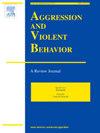Effectiveness of Virtual Reality interventions for aggression, anger and impulsiveness: A multilevel meta-analysis
IF 3.4
2区 心理学
Q1 CRIMINOLOGY & PENOLOGY
引用次数: 0
Abstract
Interventions based on Virtual Reality (VR) appear to be a promising option for the treatment of aggression, enabling the creation of immersive simulations for individuals to learn and practice strategies in a controlled and supervised environment.
The aim of this study is to determine the effectiveness of VR interventions in reducing anger, aggression and impulsiveness. A systematic search produced eleven valid articles for a meta-analysis consisting of a total sample of 479 participants aged 26.37 ± 18.5, of whom 88.1 % were men.
The study found a statistically significant reduction in observer reported aggression (g = −0.27; p = 0.029), self-reported aggression (g = −0.47; p < 0.001), anger (g = −0.74; p = 0.005) and impulsiveness (g = −0.47; p < 0.001). Regarding the possible improvement over conventional therapies or waiting list control groups, the weighted mean difference analysis revealed a significant overall effect favouring VR intervention over the control groups (g = −1.05; p = 0.003), although specific analysis for the different outcomes could not be conducted due to the limited number of studies reporting control group data.
These results suggest that the use of VR can be effective in reducing aggression, anger and impulsiveness. Differences in effectiveness may be partially explained by the heterogeneity of the interventions and study samples. The possible biases of the selected studies and the limitations of the meta-analysis itself are considered. Future research may use these findings to optimise the effectiveness of therapeutic interventions using VR.
虚拟现实干预攻击、愤怒和冲动的有效性:一项多层次元分析
基于虚拟现实(VR)的干预措施似乎是治疗攻击的一个很有前途的选择,它可以为个人创造沉浸式模拟,让他们在受控和监督的环境中学习和练习策略。
本文章由计算机程序翻译,如有差异,请以英文原文为准。
求助全文
约1分钟内获得全文
求助全文
来源期刊

Aggression and Violent Behavior
Multiple-
CiteScore
7.50
自引率
4.30%
发文量
63
期刊介绍:
Aggression and Violent Behavior, A Review Journal is a multidisciplinary journal that publishes substantive and integrative reviews, as well as summary reports of innovative ongoing clinical research programs on a wide range of topics germane to the field of aggression and violent behavior. Papers encompass a large variety of issues, populations, and domains, including homicide (serial, spree, and mass murder: sexual homicide), sexual deviance and assault (rape, serial rape, child molestation, paraphilias), child and youth violence (firesetting, gang violence, juvenile sexual offending), family violence (child physical and sexual abuse, child neglect, incest, spouse and elder abuse), genetic predispositions, and the physiological basis of aggression.
 求助内容:
求助内容: 应助结果提醒方式:
应助结果提醒方式:


